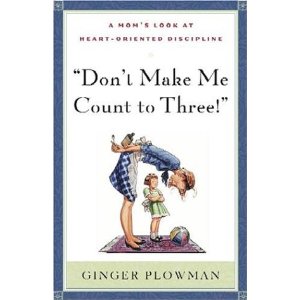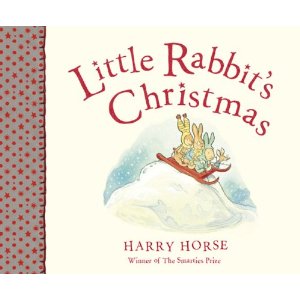Roughly three years ago, I read Ginger Plowman’s book, Don’t Make Me Count to Three. It’s a fantastic resource with lots of practical advice for dealing with kids in a way that points to Christ. 

For instance, if my kid locks me out of the house to avoid a scolding (purely hypothetical, mind you), when I correct him, I don’t say, “Now, Tim, that was a silly thing to do.” I tell him it was sin and that it was wrong not because it inconvenienced mommy, but because it broke God’s law. God has said children should respect their parents. It’s not respectful or obedient to lock mommy out of the house. Thus, Tim has sinned and broken God’s law to do so. (Just for the record, I don’t think there’s any need to be legalistic about this. But as a general rule, I do think it’s helpful.)
This seems like a small difference. But using the categories of Scripture to rebuke and restore does two things, at least: 1) it makes the Bible relevant for kids. They can understand the language of Scripture because they see how it applies in their everyday lives; and 2) it teaches them to interpret everyday life through a Biblical lens.
What does all this have to do with kids’ books? As I began to look for opportunities to build a Biblical worldview in my children, I quickly found that Ginger’s advice–to speak in Biblical terms–was often effective in those happy moments reading a book to them. Snuggled up to mommy, listening to the trials and tribulations of talking animals, my kids are open to instruction in a way they usually weren’t when they’d just had a temper-tantrum. Plus it’s not about them–the distance of the characters makes it a safe place to think about the consequences of actions.
Of course, some books are better than others for this. Some books are just silly and funny, and they aren’t meant to be taken too seriously. I’m imagining here someone trying to make Mr. Brown Can Moo a proof-text for some spiritual insight…and yeah, I think a lot of Dr. Suess falls under the category of pure silliness. (Although Green Eggs and Ham does seem pretty preachy about the benefits of colored eggs.)


Talking about the story in terms of idolatry–that what happens to Little Rabbit is what happens when we idolize something–has been very fruitful in my kids’ lives. So often we become obsessed with the gift over and above the giver, and we can’t enjoy God’s many blessings in our lives. But when we love God first, what does He give us back? “Seek ye first the kingdom of God…and all these things shall be added unto you.” I would even go so far as to ask my kids, “What is like that sled for you?” The give and take has been so insightful for us all.
Of course, that’s just one way of helping kids see life in Biblical terms. Hopefully soon I can tease out some other books and questions that would be useful for this exercise. Til then, do you have any books, Christian or secular that have been really eye-opening for your kids when it comes to seeing the world aright?
For more insight on choosing good kids’ books, check out our interview with Tim Challies or Janie’s post Three Cheers for Free Enterprise: The King of Mulberry Street. Or read more of my picks for younger kids in $20 Bookshelf Challenge: Best Books for Beginners.
Stay Up to Date!
Get the information you need to make wise choices about books for your children and teens.
Our weekly newsletter includes our latest reviews, related links from around the web, a featured book list, book trivia, and more. We never sell your information. You may unsubscribe at any time.
Support our writers and help keep Redeemed Reader ad-free by joining the Redeemed Reader Fellowship.
Stay Up to Date!
Get the information you need to make wise choices about books for your children and teens.
Our weekly newsletter includes our latest reviews, related links from around the web, a featured book list, book trivia, and more. We never sell your information. You may unsubscribe at any time.
FREE Bible Guide!
Get a guide to the Best Bibles for Children and Teens. Perfect for an Easter gift.
We'd love to hear from you!
Our comments are now limited to our members (both Silver and Golden Key). Members, you just need to log in with your normal log-in credentials!
Not a member yet? You can join the Silver Key ($2.99/month) for a free 2-week trial. Cancel at any time. Find out more about membership here.
4 Comments
Leave a Comment
You must be logged in to post a comment.


Thanks for the great insight! Here’s one that our family enjoyed a while back which we used as a springboard for discussing pride.
https://www.hankinsfamily.com/2009/10/book-review-baby-bear-discovers-world.html
Thanks, Elizabeth. My kids really love books about animals…and they have issues with pride, so that book should be right up their alley!!
The original Pinocchio is full of lessons from Proverbs!
Pinocchio, eh? It’s certainly a sowing and reaping sort of book, isn’t it? Thanks for the suggestion, Megan.